|
|
|
Sort Order |
|
|
|
Items / Page
|
|
|
|
|
|
|
| Srl | Item |
| 1 |
ID:
107559
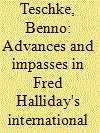

|
|
|
|
|
| Publication |
2011.
|
| Summary/Abstract |
How did Fred Halliday recast International Relations (IR) theory as international historical sociology? This article explores Halliday's intellectual trajectory across this terrain and suggests that the notion of 'capitalist modernity', derived from an amalgamation of neo-Marxian and neo-Weberian historical sociology, functioned as the strategic master-category, which anchored his thought on International Relations throughout his work. This category was successively reconceived and complemented to generate four, partly contradictory, analytical frameworks at a lower level of abstraction: 'global conjunctural analysis'; a neo-Weberian 'sociology of the inter-state system'; 'international society as homogeneity' and 'uneven and combined development'. The article identifies the advances and impasses in each intellectual move and exemplifies the limits of Halliday's approach in relation to his analysis of revolutions. It suggests that while Halliday was instrumental in reconnecting IR with historical sociology, providing crucial openings and correctives to mainstream IR theory, his theoretical emphases remained ultimately too syncretistic and additive to shift the debate on firmer ground. While this can be read as a failure, there is also evidence to understand this anti-formalism as a deliberate intellectual choice. The article concludes by suggesting that the very term international historical sociology, predicated on a distinct modernist vocabulary, may itself preclude a full historicization of categories of analysis, restricting its use as a general framework for capturing the historicity and sociality of geopolitical practices across time and space.
|
|
|
|
|
|
|
|
|
|
|
|
|
|
|
|
| 2 |
ID:
107562
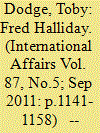

|
|
|
|
|
| Publication |
2011.
|
| Summary/Abstract |
This article examines Fred Halliday's research and writing on the politics of the Middle East. It classifies Halliday as a 'high modernist', who organized his work around a constant commitment to a universal rationality, historical progress and an opposition to relativism and a particularist reading of the Middle East. The article identifies the two dominant units of analysis that shaped Halliday's work on the region throughout his life. These were the transformative capacity of capitalism and the role of a comparatively autonomous state. The article then examines how the content of each unit was transformed as Halliday moved from an overt Marxism to a more diffuse liberalism. It then goes on to argue that Halliday's ideological affinities and his deployment of these units marginalized the role and importance of ideology, specifically both nationalism and Islamism. Finally, it traces the influence of this approach and the deployment of these units in Halliday's work on Iran, Iraq and the Arab-Israeli conflict.
|
|
|
|
|
|
|
|
|
|
|
|
|
|
|
|
| 3 |
ID:
107560
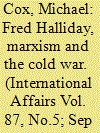

|
|
|
|
|
| Publication |
2011.
|
| Summary/Abstract |
Though possibly best known today as a specialist on the Middle East and Islam, it is often forgotten how central the Cold War was in defining Fred Halliday's understanding of world politics before 1989 and indeed even after. Building on the earlier work of Isaac Deutscher and E. H. Carr, Halliday developed a distinct theory of the Cold War which afforded him great insights but ultimately failed in explaining the complexities of the East-West relationship, and why it came to an abrupt conclusion in the late 1980s.
|
|
|
|
|
|
|
|
|
|
|
|
|
|
|
|
| 4 |
ID:
107558
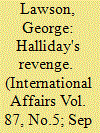

|
|
|
|
|
| Publication |
2011.
|
| Summary/Abstract |
Fred Halliday saw revolution and war as the dual motors of modern international order. However, while war occupies a prominent place in International Relations (IR), revolutions inhabit a more residual location. For Halliday, this is out of keeping with their impact-in particular, revolutions offer a systemic challenge to existing patterns of international order in their capacity to generate alternative orders founded on novel forms of political rule, economic organization and symbolic authority. In this way, dynamics of revolution and counter-revolution are closely associated with processes of international conflict, intervention and war. It may be that one of the reasons for Halliday's failure to make apparent the importance of revolutions to IR audiences was that, for all his empirical illustrations of how revolutions affected the international realm, he did not formulate a coherent theoretical schema which spoke systematically to the discipline. This article assesses Halliday's contribution to the study of revolutions, and sets out an approach which both recognizes and extends his work. By formulating ideal-typical 'anatomies of revolution', it is possible to generate insights that clarify the ways in which revolutions shape international order.
|
|
|
|
|
|
|
|
|
|
|
|
|
|
|
|
| 5 |
ID:
107566


|
|
|
|
|
| Publication |
2011.
|
| Summary/Abstract |
How should we understand the cultural politics that has surrounded the development of international human rights? Two perspectives frame contemporary debate. For 'cultural particularists', human rights are western artefacts; alien to other societies, and an inappropriate basis for international institutional development. For 'negotiated universalists', a widespread global consensus undergirds international human rights norms, with few states openly contesting their status as fundamental standards of political legitimacy. This article advances an alternative understanding, pursuing John Vincent's provocative, yet undeveloped, suggestion that while the notion of human rights has its origins in European culture, its spread internationally is best understood as the product of a 'universal social process'. The international politics of individual/human rights is located within an evolving global ecumene, a field of dynamic cultural engagement, characterized over time by the development of multiple modernities. Within this field, individual/human rights have been at the heart of diverse forms of historically transformative contentious politics, not the least being the struggles for imperial reform and change waged by subject peoples of diverse cultural backgrounds; struggles that not only played a key role in the construction of the contemporary global system of sovereign states, but also transformed the idea of 'human' rights itself. In developing this alternative understanding, the article advances a different understanding of the relation between power and human rights, one in which rights are seen as neither simple expressions of, or vehicles for, western domination, nor robbed of all power-political content by simple notions of negotiation or consensus. The article concludes by considering, in a very preliminary fashion, the implications of this new account for normative theorizing about human rights. If a prima facie case exists for the normative justifiability of such rights, it lies first in their radical nature-in their role in historically transformative contentious politics-and second in their universalizability, in the fact that one cannot plausibly claim them for oneself while denying them to others.
|
|
|
|
|
|
|
|
|
|
|
|
|
|
|
|
| 6 |
ID:
107565


|
|
|
|
|
| Publication |
2011.
|
| Summary/Abstract |
While R. J. Vincent's overall goal in Human rights and International Relations was to demonstrate how human rights might be promoted in international society, there was one area in which he was sceptical about allowing human rights to serve as the basis for international conduct: military intervention. This article begins by demonstrating that Vincent's greatest fear-that legitimizing humanitarian intervention would lead to countless wars-has proved largely unfounded. Nonintervention in the face of gross violations of human rights has marked the post-Cold War period more than rampant interventionism. Moreover, while the use of force for humanitarian purposes has become acceptable in very exceptional circumstances, the manner in which it has been legitimized and the depth of the consensus around its appropriateness illustrate lingering scepticism among states about infringements of sovereignty. The article concludes by showing how Vincent's writings on humanitarian intervention, in particular his caution about an imperialist advance of cosmopolitanism, might provide a basis for a more robust normative defence of pluralism in contemporary international society.
|
|
|
|
|
|
|
|
|
|
|
|
|
|
|
|
| 7 |
ID:
107564
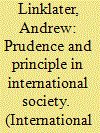

|
|
|
|
|
| Publication |
2011.
|
| Summary/Abstract |
John Vincent's Human rights and International Relations argued for embedding the right to be free from starvation in the international society of states. Principle and prudence were combined in a distinctive English School analysis of the universal human rights culture. Vincent argued that the entitlement to be free from the tyranny of starvation and malnutrition was one principle on which most societies could agree despite their profound ideological differences. Other conceptions of human rights, including western liberal doctrines of individual freedom, had the potential to create major divisions within international society, particularly when linked with a doctrine of humanitarian intervention. More recent approaches to world poverty raise large questions about whether Vincent succeeded in attempting to marry prudence in preserving an international order that remains anchored in state sovereignty with a principled commitment to ending starvation. Important issues also arise about how to build on his reflections on the prospects for a global 'civilizing process' that bridges cultural and political differences in the first universal society of states.
|
|
|
|
|
|
|
|
|
|
|
|
|
|
|
|
| 8 |
ID:
107561


|
|
|
|
|
| Publication |
2011.
|
| Summary/Abstract |
This article offers a critical assessment of Fred Halliday's theorization of the Cold War and, in particular, his attempt to offer a more global perspective on it through a greater focus on the role of developments emanating from the Third World as constitutive of the Cold War. The author argues that although Halliday's theorization of the Cold War as 'inter-systemic conflict' is a major advance in our understanding of the Cold War-through the attention it pays to the causal linkages between capitalist development and imperialism, revolutionary transformations and superpower geopolitical confrontations-it fails, ultimately, to fulfil its potential as a theory of global Cold War. Halliday's temporalization of the Cold War and his insistence on the autonomy of the superpower arms race and strategic competition end up detaching developments in the Third World from the axis of superpower conflict and, consequently, suggests a residual Eurocentrism within his theory. The article begins by contextualizing the wider theorization of the Cold War and the (absence) place of the Third World in it. It then proceeds to assess critically Halliday's conceptualization of the Third World in the Cold War. The final section outlines an alternative theoretical framework for a theory of global Cold War that builds on elements of inter-systemic conflict focused on how geopolitical confrontations involving the superpowers derived from the revolutionary consequences of uneven capitalist development.
|
|
|
|
|
|
|
|
|
|
|
|
|
|
|
|
| 9 |
ID:
107557


|
|
|
|
|
| Publication |
2011.
|
| Summary/Abstract |
Fred Halliday's life and work were intimately associated with the theory and practice of internationalism. In his later writings, the notion of 'complex solidarity' emerges as a key component of Halliday's worldview. This article explores the conceptual interconnections between different historical expressions of internationalism, cosmopolitanism and solidarity. It considers the intricate relationship between these categories and their place in our understanding of international affairs, emphasizing the divergence between liberal and revolutionary conceptions of internationalism and cosmopolitanism. The article discusses diverse understandings of 'solidarity' in International Relations, arguing that beyond the cosmopolitan and communitarian approaches, there exist other 'Grotian' and 'republican' ideas of solidarity. Halliday drew on these to present his own defence of universal human rights and solidarity, arguably developing a distinctive brand of republican internationalism. The latter part of the article gives content to 'complex solidarity' by suggesting it is built on three inter-related components: a methodological internationalism, an egalitarian reciprocity and a critique of global capitalism. Overall, these guiding features of complex solidarity deliver a unique rendition of internationalism which reflect Halliday's eclectic combination of radical liberalism with a residual historical materialism.
|
|
|
|
|
|
|
|
|
|
|
|
|
|
|
|
| 10 |
ID:
107563


|
|
|
|
|
| Publication |
2011.
|
| Summary/Abstract |
This article revisits the arguments of John Vincent's influential 1986 book, Human rights and International Relations and situates them against the context both of the debates of his own time and the debates of the early twenty-first century. Vincent's arguments are assessed and evaluated in their own terms and compared and contrasted with dominant positions today. The arguments are then assessed in the light of two leading critical perspectives on human rights before considering a final criticism of the possibility and desirability of the current human rights regime in International Relations.
|
|
|
|
|
|
|
|
|
|
|
|
|
|
|
|
|
|
|
|
|